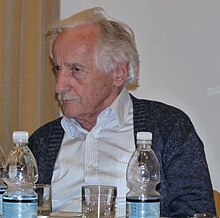Veno Taufer
Veno Taufer | |
|---|---|
 Taufer in 2012 | |
| Born | 19 February 1933 Ljubljana, Drava Banovina, Kingdom of Yugoslavia |
| Died | 20 May 2023 (aged 90) Topolšica, Slovenia |
| Occupation |
|
Venčeslav "Veno" Taufer (19 February 1933 – 20 May 2023) was a Slovenian poet, essayist, translator and playwright. Under the
Biography
Taufer was born Venčeslav Taufer in
In 1944, he moved to Ljubljana, where he attended high school. He enrolled at the
In 1961, he briefly worked as an editor for the Slovenian Television service,[2] but soon resigned in the face of political pressures. Between 1962 and 1964, he worked as the director of the alternative theatre Oder 57, staging innovative and subversive plays by Slovenian and foreign modernist authors, among them Dominik Smole, Primož Kozak and Marjan Rožanc. In the mid 1960s, he also collaborated on the alternative journal Perspektive, although he never joined its editorial board.
After the prohibition of the journal Perspektive in 1964, Taufer withdrew from public life, dedicating most of his time to translating. In 1966, he moved to London, where he worked at the Yugoslav section of the BBC. He returned to Slovenia in 1970, and was employed once again by the Slovenian television service, where he worked as an editor in the cultural programme section.
In the early 1980s, he was one of the founders of the new alternative journal
Between 1990 and 1995, he worked as an advisor at the Ministry of Culture of Slovenia. In 1996, he received the Prešeren Award for life achievements.
In the 1990s, Taufer was supportive of various humanitarian activities during the
In 2002 Taufer received the Jan Smrek Prize, the highest literature prize given to foreign writers in Slovakia. In 2011 he became president of the Slovene Writers' Association.
Taufer was the father of film director Lara Simona Taufer.
Veno Taufer died on 20 May 2023, at the age of 90.[3][4][5]
Work
Taufer began his public literary career in 1956 and 1957, when he published poems in the student journal Tribuna. During the period of 1958–72, he established himself as a poet. Other notable Slovenian poets of the time include, Gregor Strniša, Dane Zajc, Tomaž Šalamun, and Jože Snoj.
Taufer published a collection titled Lead Stars (Svinčene zvezde) in 1958. His second collection of poems, published in 1963, dealt mostly with love themes. His third collection, titled Exercises and Tasks (Vaje in naloge) and published in 1969, is considered[by whom?] to be Taufer's most daring poetic achievement. Taufer used extracts and collages in an accumulation of allusions to political reality, using parody in order to convey his message. In his later poetry in the 1970s, his literary experimentation went even further, marking the way to a complete transformation of poetic language, which would be then picked up by younger poets, especially by Tomaž Šalamun and Niko Grafenauer.[citation needed]
Taufer's poetry of the 1970s and 1980s has entered the canon of modern
The poems in the collection Water Marks (Vodenjaki), published 1986, record a story of chaos, and a decline of civilization, cultures, beliefs, ideas and values. The collection Crocks of Songs (Črepinje pesmi), published 1989, shows clear influences by Ezra Pound. The poems contained in this collection use fragments from ancient Greek myths, archaic images and visions of disasters, mobilized as an instrument of post-modern reality.
During the 1990s, his most important collection of poetry was Still Odes (Še ode), published 1996, which marks a return to classical poetic forms, mostly sonnets. The collection is opened by two poems containing a violent condemnation of the destruction of
Taufer also wrote several plays. His best-known play is called Odysseus & Son or on the World and Home (1990), in which he renews the story of Odysseus and Telemachus, including whole passages from Homer's text, supplemented by fragments from diverse genres.
References
- ^ (14 July 2011). Stari sloni, do zadnjega diha na okopih, Dnevnik (Slovenia) (in Slovenian)
- ^ a b c Stanko Janež (1971). Živan Milisavac (ed.). Jugoslovenski književni leksikon [Yugoslav Literary Lexicon] (in Serbo-Croatian). Novi Sad (SAP Vojvodina, SR Serbia): Matica srpska. p. 535.
- ^ "Umrl je pesnik, dramatik in prevajalec Veno Taufer". Delo. 22 May 2023. Retrieved 22 May 2023.
- ^ "Umrl je Veno Taufer". SiolNET. 22 May 2023. Retrieved 22 May 2023.
- ^ "Umrl pesnik, dramatik in prevajalec Veno Taufer". 24ur.com. 22 May 2023. Retrieved 22 May 2023.
